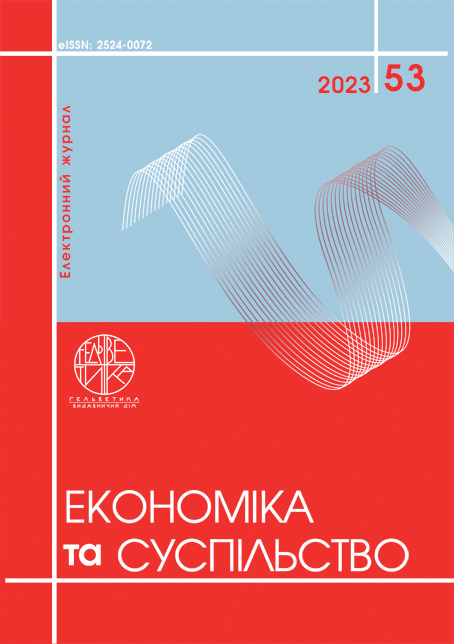LEADERSHIP AS A COMPETITIVE ADVANTAGE IN THE RESTAURANT BUSINESS
Abstract
The article is aimed at disclosing the relationship between the term’s «competitiveness» and «leadership» in the sphere of restaurant business, as well as searching for opportunities for their realization in practice. The study of the terms «competitiveness» and «leadership» showed that there is no single interpretation of them. It is determined that the profound political and socio-economic changes taking place in Ukraine in recent years have negatively affected the development of domestic business of all forms of ownership, including the restaurant business. Covid-19 quarantine restrictions, on the one hand, created an array of problem, but, on the other hand, created the basis for reviewing business in terms of innovation. This process also negatively affected competition and leadership in the restaurant business. The term «competitiveness of industry» is investigated and it is found that classified competitive factors are the same at all levels of competition, but they have different weight. Analyzing factors, emphasis was placed on the level of controllability of them, the environment of their functioning and the definition that are most suitable for creating competitive advantages. The conducted study of the term «leadership» gives grounds to identify it with the term «competitive advantages», which depend on the level of development of the triad: leader – team – leader. It is noted that the process of creating competitive advantages is complex and depends on many factors that can grow into advantages. These benefits will show the level of accumulation of certain resources in the economic or organizational spheres of business and will be measured by economic indicators. It is proved that the term «leadership» can be identified with the term «competitive advantages» in the context of availability of certain qualitative parameters that contribute to achieving a proactive position in relation to competitors, including competing enterprises. It is proposed to introduce a culture of leadership (corporate) in three planes: functional, commodity and regional, which will maximally contribute to the development of the restaurant business.
References
Гохберг О.Ю. Конкурентоспроможність бізнесу: теоретико–методологічні основи аналізу. Вісник Львівської державної фінансової академії. 2010. № 18. С. 50–56.
Крикавський Є.В., Чухрай Н.І. Промисловий маркетинг : підручник. Львів : Видавництво Націон. ун-ту «Львівська політехніка», 2004. 428 с.
Шевченко М.М. Методи оцінки конкурентоспроможності галузей промисловості в умовах інтернаціоналізації : автореф. дис. на здобуття наук. ступеня канд. екон. наук : спец. 08.07.01 «Економіка промисловості». Харків, 2006. 16 с.
Остапенко А.В. Визначення сутності поняття «конкурентоспроможність галузі». Бізнес Інформ. 2015. № 5. С. 15–23.
Hеckscher E.F. The Effekt of Foreign Trad on Distribution of Income. / Reading in the Theory of International Trade. Blakiston Series of Republished Articles on Economics. 1919. № 4. P. 386.
Скупейко В.В., Лихолат С.М. Імплементація європейських засад формування конкурентоспроможності сільськогосподарських підприємств. Науковий вісник Ужгородського національного університету : серія: Міжнародні економічні відносини та світове господарство. 2018. Вип. 18 Ч. 3. С. 65–69.
Кузьмін О.Є., Горбаль Н.І. Управління міжнародною конкурентоспроможністю підприємства (організації) : навч. посібник. Львів : Вид-во Національного університету «Львівська політехніка», 2004. 188 с.
Романовський О.Г., Гура Т.В., Книш А.Є. Розвиток лідерського потенціалу особистості в Центрі лідерства Національного технічного університету «Харківський політехнічний інститут». Теоретичний та науково-методичний часопис «Вища освіта України». 2017. № 1. С. 96–100.
Іванова Н.Г. Психологічні засади лідерства в системі стратегічних комунікацій : навч. посібн. Київ : Національна академія Служби безпеки України, 2022. 119 с.
Виноградський М.Д., Бєляєва С.В., Виноградська А.М. та ін. Управління персоналом : навч. посібн. Київ : ЦУЛ, 2006. 504 с.
Костишина Т.А., Нестуля О.О., Нестуля С.І. та ін. Лідерство в управлінні персоналом. Управління персоналом у ХХІ столітті: кадрова політика, мотивація, оплата праці : монографія. Полтава : Полтав. літератор, 2010. 498 с.
Hokhberh, O. (2010). Konkurentospromozhnist biznesu: teoretyko–metodolohichni osnovy analizu [Business competitiveness: theoretical and methodological foundations of analysis]. Visnyk Lvivskoi derzhavnoi finansovoi akademii, 18, 50–56. [in Ukrainian]
Krykavskyi, Ye.V. & Chukhrai, N.I. (2004). Promyslovyi marketynh [Industrial marketing]. Lviv: Vydavnytstvo Natsion. un-tu «Lvivska politekhnika». [in Ukrainian]
Shevchenko, M.M. (2006). Metody otsinky konkurentospromozhnosti haluzei promyslovosti v umovakh internatsionalizatsii [Methods for assessing the competitiveness of industries in terms of internationalization]. Extended abstract of Candidate’s thesis. Kharkiv. [in Ukrainian]
Ostapenko, A. (2015). Vyznachennia sutnosti poniattia «konkurentospromozhnist haluzi» [Definition of the essence of the concept of «competitiveness of the industry]. Biznes Inform, 5, 15–23. [in Ukrainian]
Hеckscher, E. (1919). The Effekt of Foreign Trad on Distribution of Income. Reading in the Theory of International Trade. Blakiston Series of Republished Articles on Economics, 4, 386.
Skupeiko, V. & Lykholat, S. (2018). Implementatsiia yevropeiskykh zasad formuvannia konkurentospromozhnosti silskohospodarskykh pidpryiemstv [Implementation of European principles of formation of competitiveness of agricultural enterprises]. Naukovyi visnyk Uzhhorodskoho natsionalnoho universytetu : seriia: Mizhnarodni ekonomichni vidnosyny ta svitove hospodarstvo, 18(3), 65–69. [in Ukrainian]
Kuzmin, O.Ye. & Horbal, N.I. (2004). Upravlinnia mizhnarodnoiu konkurentospromozhnistiu pidpryiemstva (orhanizatsii) [Management of international competitiveness of the enterprise (organization)]. Lviv : Vydavnytstvo Natsion. un-tu «Lvivska politekhnika». [in Ukrainian]
Romanovskyi, O.H., Hura, T.V. & Knysh A.Ye. (2017). Rozvytok liderskoho potentsialu osobystosti v Tsentri liderstva Natsionalnoho tekhnichnoho universytetu «Kharkivskyi politekhnichnyi instytut» [Development of the leadership potential of the individual at the Leadership Center of the National Technical University «Kharkiv Polytechnic Institute»]. Teoretychnyi ta naukovo-metodychnyi chasopys «Vyshcha osvita Ukrainy», 1, 96–100. [in Ukrainian]
Ivanova, N.H. (2022). Psykholohichni zasady liderstva v systemi stratehichnykh komunikatsii [Psychological principles of leadership in the system of strategic communications]. Kyiv : Natsionalna akademiia Sluzhby bezpeky Ukrainy. [in Ukrainian]
Vynohradskyi, M.D., Bieliaieva, S.V. & Vynohradska, A.M. (2006). Upravlinnia personalom [HR management]. Kyiv: TsUL. [in Ukrainian]
Nestulia, O.O., Kostyshyna, T.A. & Nestulia, S.I. (2010). Liderstvo v upravlinni personalom. Upravlinnia personalom u ХХІ stolitti: kadrova polityka, motyvatsiia, oplata pratsi [Leadership in personnel management. Personnel management in the XXI century: personnel policy, motivation, remuneration]. Poltava: Poltav. literator. [in Ukrainian]

This work is licensed under a Creative Commons Attribution 4.0 International License.


